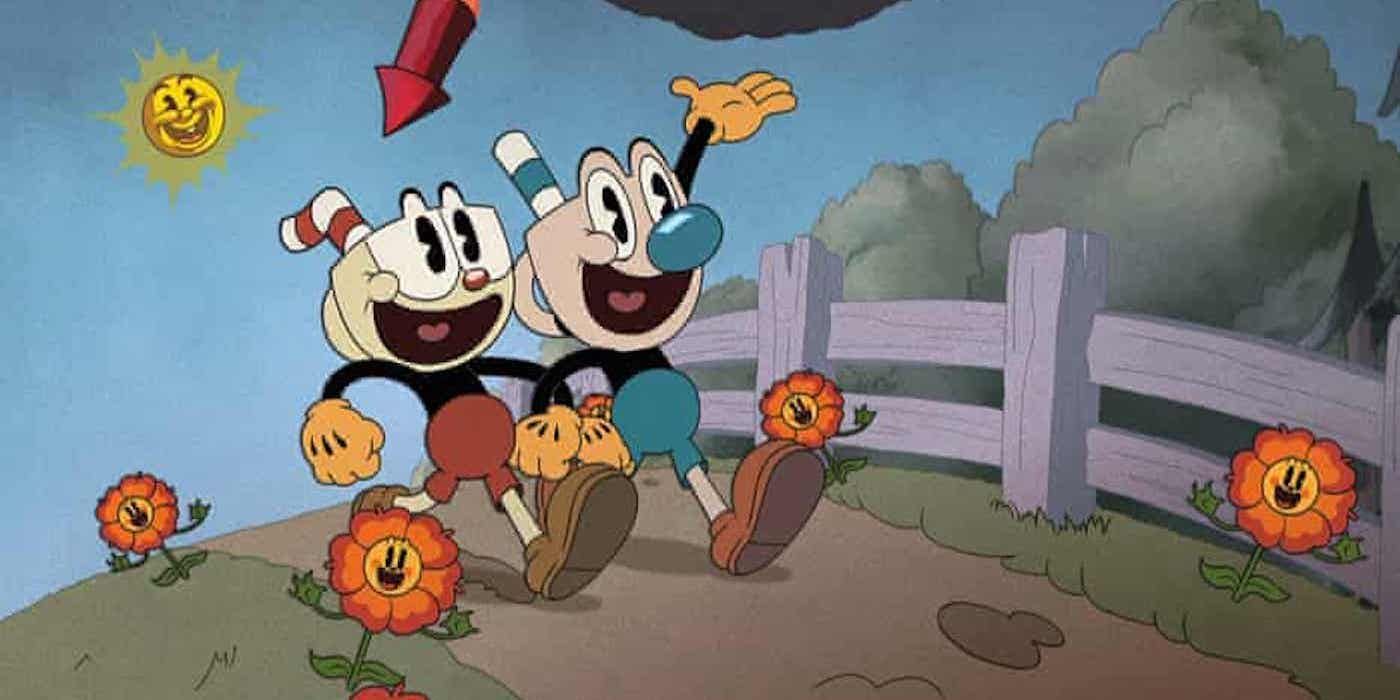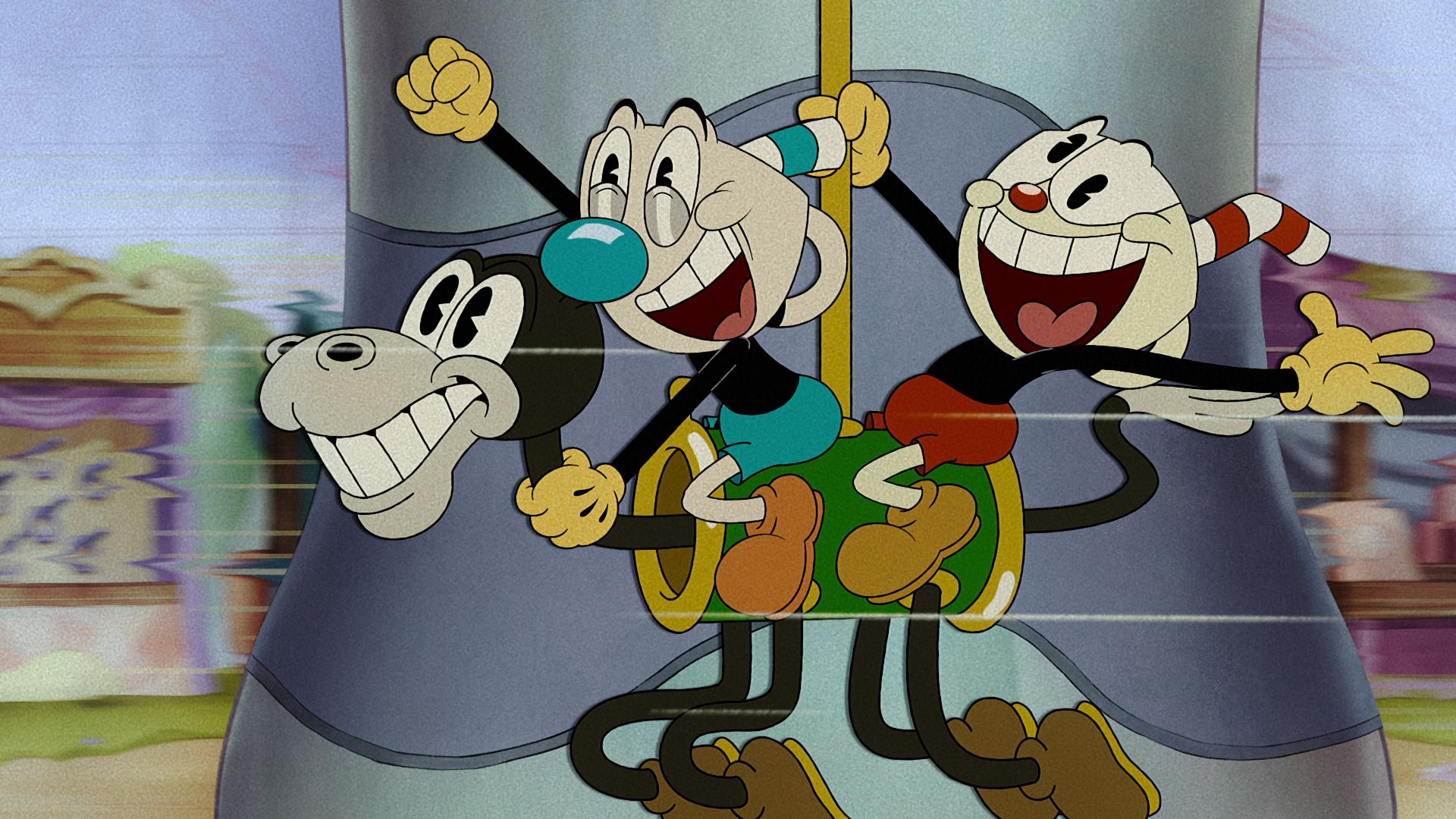The Cuphead Show’s second season has dropped on Netflix. Fans of the series may or may not know that Cuphead and Mugman didn’t actually start out as TV characters. Rather, they came from the 2017 video game, aptly called “Cuphead.” The Cuphead game was successful enough to garner its own TV series spinoff, and it achieved that success by bringing something interesting and fresh to the world of animation. Yet, when translated into a TV series, the things that made the Cuphead game feel new and engaging have managed to do the exact opposite for a television show. There’s a very clear reason why The Cuphead Show’s style worked so well for the game yet falls flat when translated into another medium.
Cuphead was inspired by the golden age of animation, which began in the 1920s and ran through the ’70s. Whether you have a vast knowledge of animation from this time period or you’re more of an animation-watching novice, most of us recognize the style, tropes, and common details of animated works of this era. Cuphead set out to remind people of this vintage kind of kids’ show and pay homage to animation’s early days. Whether an animated series seems to have any connection during this time period, all animated series have the golden age of animation to thank for where the medium is today.
It’s clear that the creators of Cuphead were well aware of this and wanted to bring it to light for folks who may not have been aware. Chock-full of little references only a true animation fanatic would catch, as well as nods to the past that we’re all bound to notice, the Cuphead video game was never shy about what it was trying to say or the inspiration it valued. This made for a unique interactive experience — like being inside the Disney works of yore and getting the ability to exist in the space we’ve all seen but never entered. Translating a kind of animation we’re all at least a little familiar with but don’t usually see in an updated way felt new and exciting, and was a uniquely successful way of marrying old technology with animation’s new abilities and a fresh way to consume animation. Making a game that feels like a retro cartoon was an unusual concept, and Cuphead was able to capture it perfectly.
Of course, a game that’s based on animated TV shows would make for a great animated TV show, itself; right? The impulse to turn Cuphead into The Cuphead Show was an understandable one. Yet, in translating a genre of television to a video game and then back to a series, something was lost in translation. The show’s second season has only worked to solidify this. Like its source material, The Cuphead Show has references from Disney and Popeye to the Looney Tunes, among others. It uses old tropes like showing floating eyeballs against a black background as Cuphead and Mugman talk to each other in the darkness, or title cards that state the episode name after a lengthy, theatrical theme song. Still, originally what Cuphead brought to the table wasn’t just about reminiscing, and as a result, simple reminiscing fails to have as much of an impact as the source material did. Rather, Cuphead was also about making the past new again, bringing it to new generations, and allowing players to immerse themselves in a world they’ve only ever watched from afar before. The Cuphead Show loses this unique experience, and in doing so, it loses what makes Cuphead what it is. Season 2 has presented viewers with another perfectly fine cartoon, but fans of the Cuphead game likely expect and crave more from this franchise.
For someone unfamiliar with Cuphead’s history, watching The Cuphead Show is certainly likely to take the viewer back to the early days in animation’s history, and it probably even does so in a way that’s comforting, wholesome, or even nostalgic. Yet, the winks to the past are not enough to sustain the series for two seasons, let alone what will likely be, at least, an inevitable third. By the same token, for real fans of the game, The Cuphead Show most likely has some particularly fun moments and in-jokes for its loyal fan base. When bosses fans have beaten in the video game make cameos in the series or familiar music appears on the soundtrack, there’s surely a level of satisfaction there and a certain joy in the recognizable.
Yet, what The Cuphead Show was capable of could have gone beyond that. The initial niche that made Cuphead so welcome and unique was its pursuit of playing with the relationship between different forms of media. As a result, this should have been captured when moving to a new medium, as well. The Cuphead Show had the ability to speak to video games in ways beyond nods that pay homage to the Cuphead game itself. Just as taking retro animation and turning it into a game made for a uniquely fulfilling experience, allowing Cuphead’s interactive origins to influence and affect the series would have made The Cuphead Show a more fitting part of this franchise, rather than this two-dimensional (no pun intended) iteration.
Ultimately, The Cuphead Show has very little to say about anything and is, rather, just a series of short, packed-to-the-brim, standalone episodes. Surely, The Cuphead Show isn’t the only series out there without some grand statement to make other than to entertain. Yet in this case, The Cuphead Show‘s lack of a mission statement may strike its audience as peculiar, since it comes from source material that actually did have an interesting perspective: bringing the past into the present. The Cuphead Show’s failure to follow in its own footsteps caused it to lose a lot of what made it special to begin with. It’s fair to argue that an animated series doesn’t need to have a particular message or even a strong purpose. Yet, as The Cuphead Show‘s lack of understanding of what it is or why persists through the series, it becomes easier for fans to disconnect from Cuphead’s original, noble mission.
Stay connected with us on social media platform for instant update click here to join our Twitter, & Facebook
We are now on Telegram. Click here to join our channel (@TechiUpdate) and stay updated with the latest Technology headlines.
For all the latest Web-Series News Click Here


